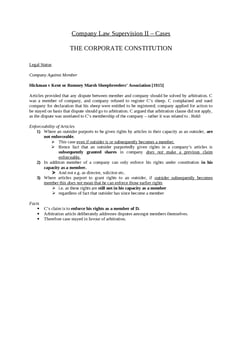Hopkins v TL Dallas Group [2004] EWHC 1379 (Ch)
Judgement for the case Hopkins v TL Dallas Group
Director signed letters of undertaking on behalf of his company to pay £1 million to company B. He did so fraudulently for his own benefit.
Company B attempted to get payment from director’s company.
Held
-
Director does not have actual authority where he acts for:
Improper purposes
Or in bad faith
Thus where director acts contrary to interests of his company, does not have actual authority.
This may be case where, e.g. director signs contracts which are very onerous and disadvantageous for his company
Facts
-
Director did not have actual authority to sign letters.
Did not fall within scope of his implied authority as director
He acted in breach of fiduciary duty when doing so
-
In addition, Company B could not rely on ostensible authority
Very facts which amounted to breach of directors’ duty put Company B on notice of lack of authority
-
I.e. transaction were so disadvantageous to director’s own company that Company B should have known director was acting in breach of duty
Or at the least, should have asked the other directors to confirm validity of transaction
Thus party cannot rely on ostensible authority where he is on notice of lack of authority
For Further Study on Hopkins v TL Dallas Group
Need instant answers? Our AI exam tutor is here to help.
Ask questions 🙋 Get answers 📔 It's simple 👁️👄👁️
Our AI is educated by the highest scoring students across all subjects and schools. Join hundreds of your peers today.
Get StartedSimilar Cases
Related Product Samples
These product samples contain the same concepts we cover in this case.
| Company Law | Company Contracts Notes (12 pages) |
| Company Law | Company Contracts Notes (3 pages) |
| Company Law | Company Contracts Cases (9 pages) |

